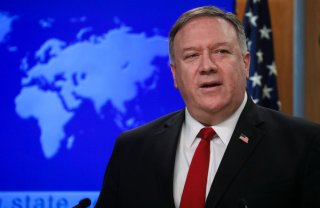How Will the Coronavirus Competition With China Affect the Middle East?
The Trump administration wants to tie Iran to the struggle with Beijing.
The struggle between the United States and Iran is “is connected to China,” Secretary of State Mike Pompeo emphasized on Friday.
U.S.-Chinese competition is ramping up amid the coronavirus pandemic, potentially pulling U.S. resources from longstanding counterterrorism campaigns in the Middle East and Central Asia. But the Trump administration also continues to pursue a campaign to counter Iran, which it portrays as intrinsically linked to Chinese influence worldwide.
“China has been one of the countries that has continued to take oil from Iran, even in light of the terror campaign that they have engaged in,” Pompeo told the Ben Shapiro Show on Friday. “The Iranians even today are working alongside the Chinese on a disinformation campaign. Authoritarian regimes in times of crisis tend to work together.”
Chinese companies continue to buy oil from Iran despite a U.S. campaign to drive Iranian oil exports to zero, although recent data suggests that Chinese-Iranian trade has plummeted overall.
Both the U.S. State Department and the European Union have warned that there is a growing “convergence” in propaganda about the coronavirus pandemic from Iran, China, and Russia.
All three countries have promoted the idea that U.S. economic sanctions on Iran have hindered the country’s response to the pandemic—a criticism that many U.S. lawmakers have voiced—in addition to more outlandish conspiracy theories.
U.S. policymakers are now planning for a shift from a U.S.-dominated world order to a period of renewed great-power competition involving the rise of China and the resurgence of Russia.
Rep. Tom Malinowski (D–N.J.) said last week that the United States is now facing “real adversaries, not little ones like Iran, but ones that can do serious damage.”
The Obama administration’s National Military Strategy of 2015 cemented great power competition as a pillar of U.S. policy, which has since been reiterated by the Trump administration’s National Security Strategy of 2017 and National Defense Strategy of 2018.
President Donald Trump has voiced skepticism over U.S. counterterrorism commitments in the Middle East and Central Asia. His administration abruptly pulled peacekeepers from the Syrian-Turkish border in October, and is engaged in a peace process that could lead to the withdrawal of U.S. troops from Afghanistan.
U.S.-led counterterrorism forces are also consolidating around a few large bases in Iraq.
But the Trump administration has also moved thousands of more troops into the region to deter Iran, and has pushed Turkey to confront Iranian and Russian forces in Syria.
Mike Doran, a senior fellow at the Hudson Institute whose views have influenced the Trump administration, put forward a mission for countering China in the Middle East that rests on three U.S. allies: Israel, Saudi Arabia, and Turkey.
“It’s our job to present to those allies . . . a general vision of order in the region,” he said at a Monday video conference hosted by the SETA Foundation, a Turkish think tank. “The number one goal of the United States in the Middle East is to weaken Iran.”
Doran claimed that great power competition will force the United States to “rediscover the importance of the U.S.-Turkish relationship,” which had fallen by the wayside as U.S. policymakers focused on non-state actors and the War On Terror.
He said that the United States should consider moving some of its supply chains from China to countries like Turkey, but also expressed skepticism that these measures could fully block Chinese economic expansion into the Middle East.
“There’s no way the United States can stop its allies in the region from having productive relations with China,” Doran said.
Matthew Petti is a national security reporter at the National Interest. Follow him on Twitter: @matthew_petti.
Image: Reuters

